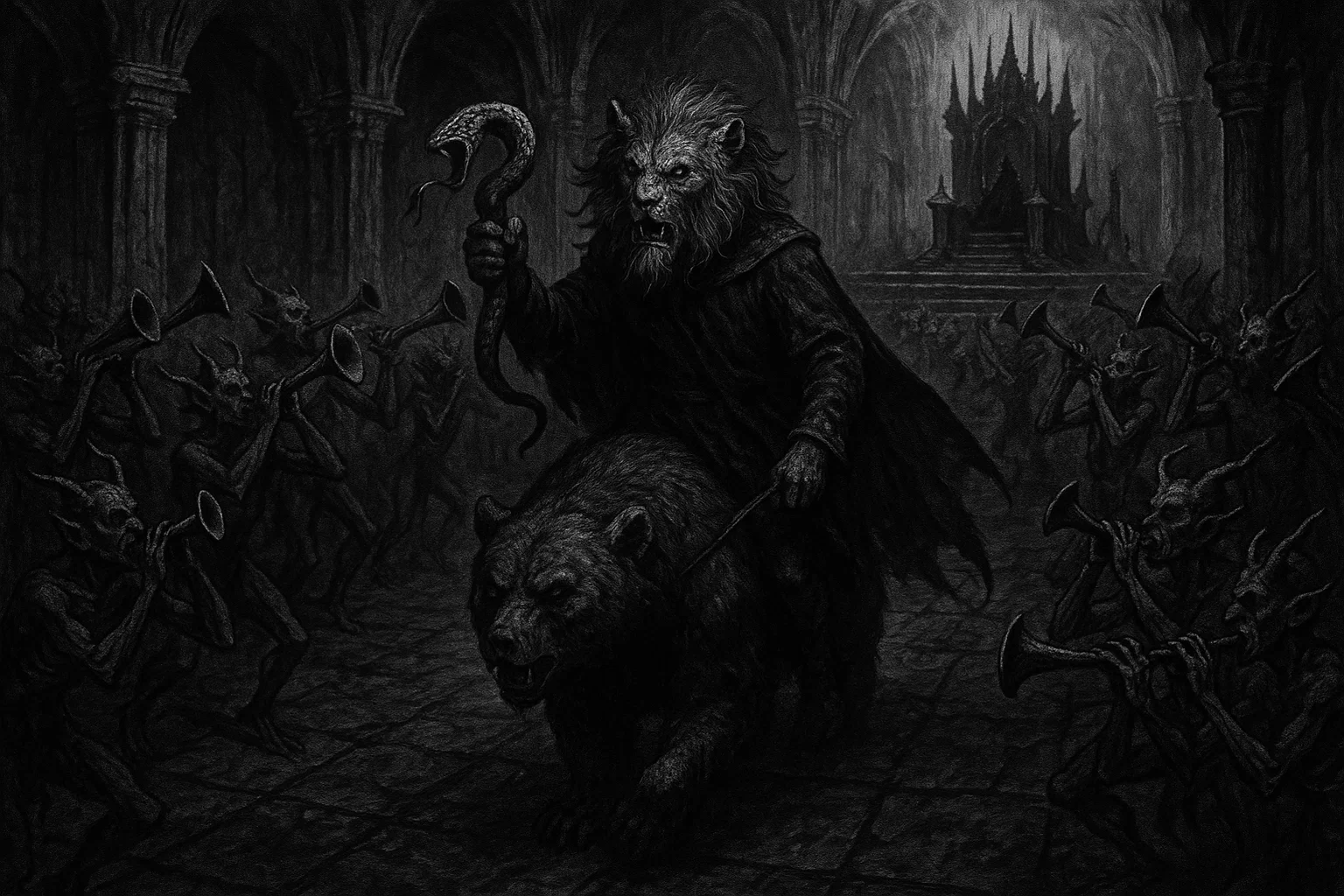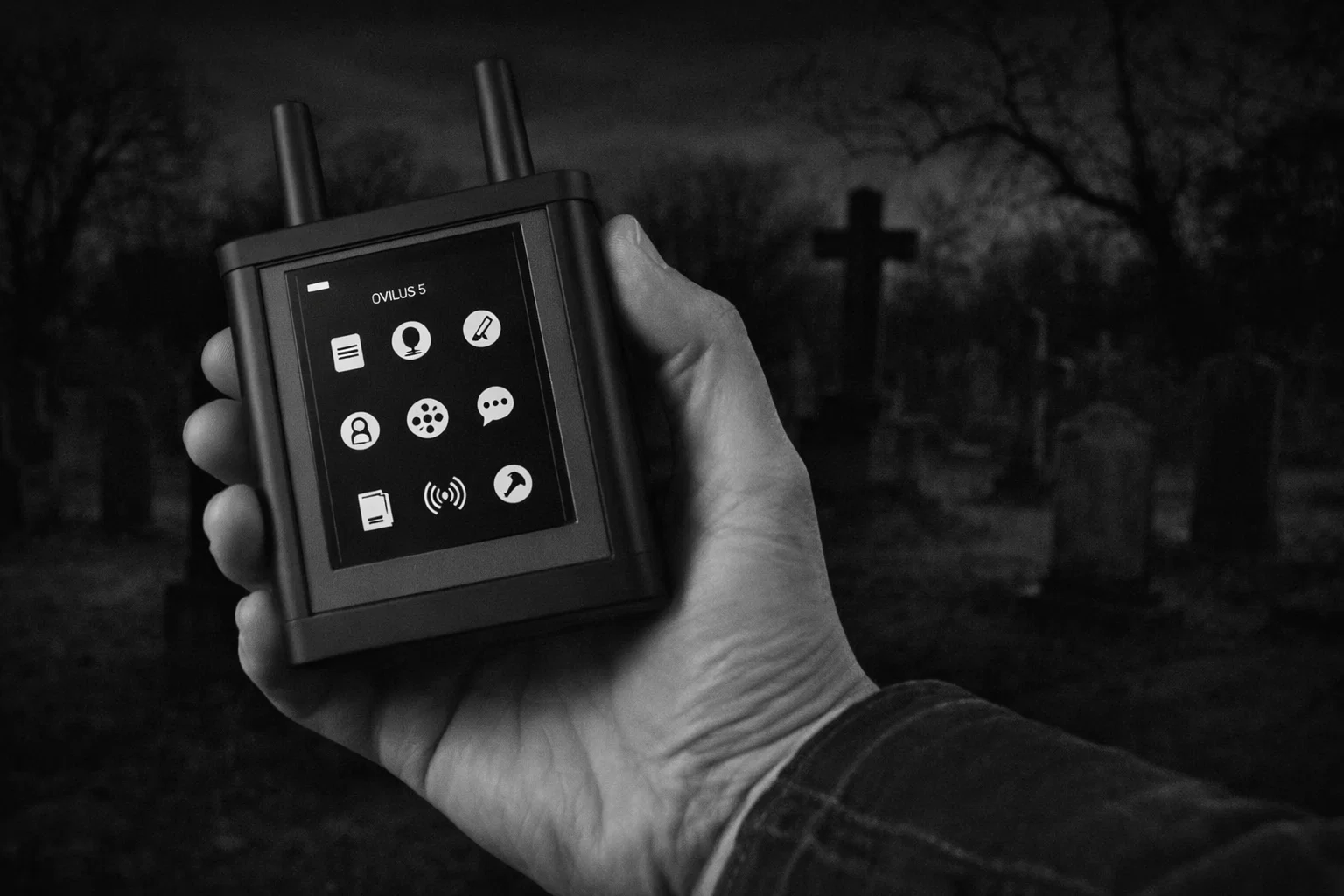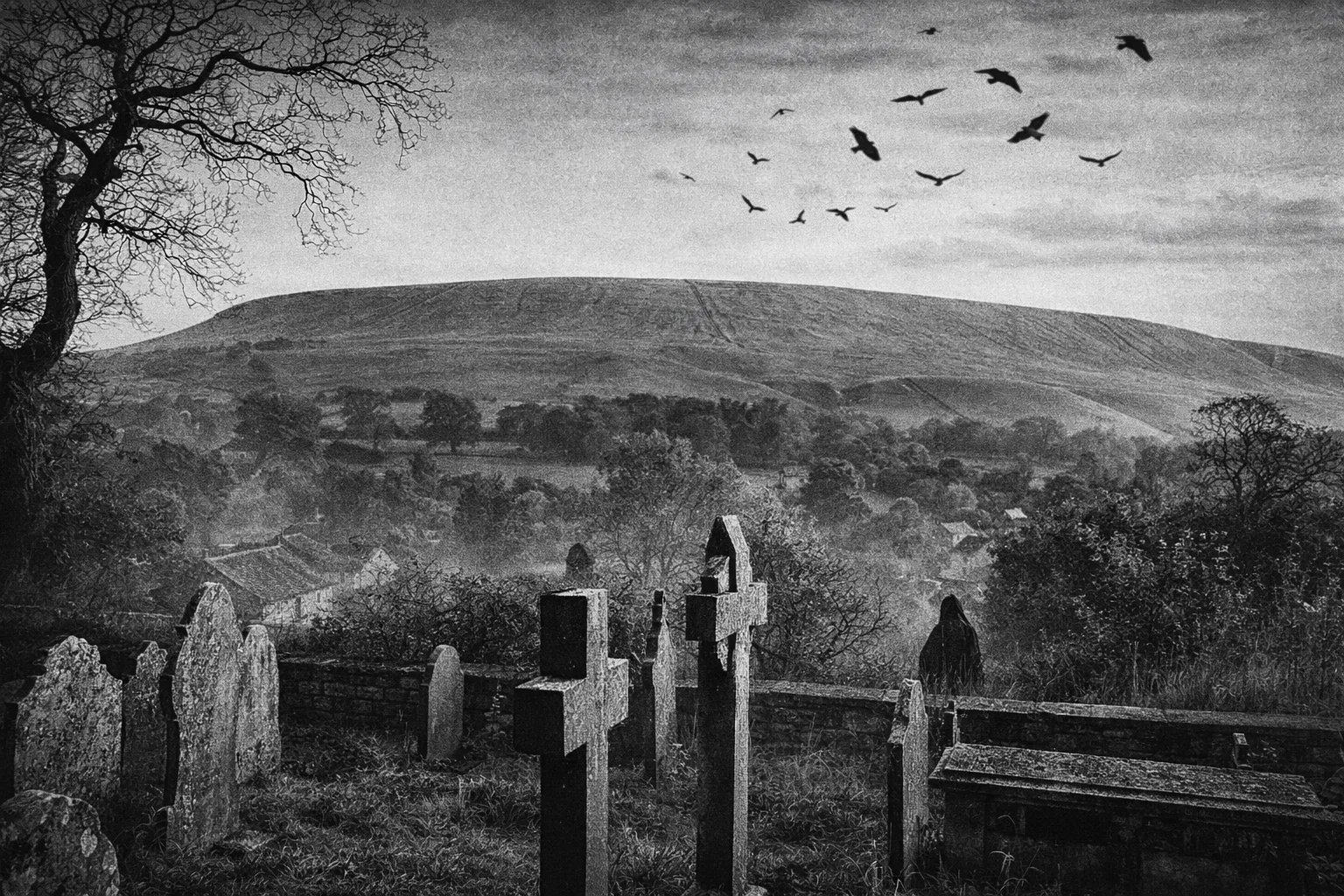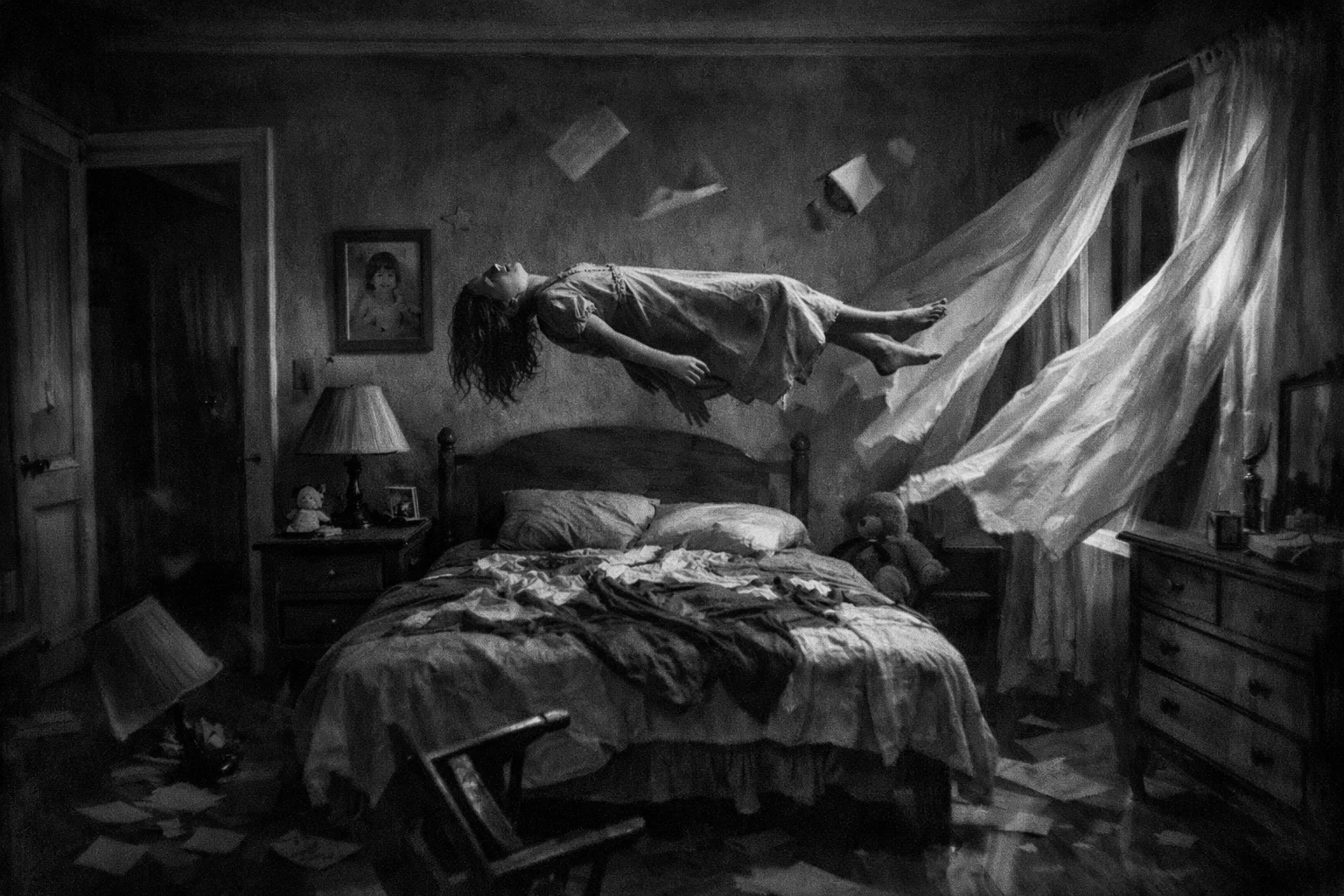Purson, the 20th spirit of the Ars Goetia is a demon of profound mystery and power. Known as a Great King of Hell, Purson commands 22 legions of demons and is revered for his ability to reveal hidden truths, locate treasures, and divine the past, present, and future.
With an appearance that blends the ferocity of a lion with the cunning of a man, he rides a bear, wields a viper, and is heralded by the sound of trumpets.
But who is Purson beyond these descriptions? What secrets does he hold, and what role does he play in the infernal hierarchy?
Summary
Key Information
The following table summarizes Purson’s attributes, drawn from traditional demonological texts like the Ars Goetia and Pseudomonarchia Daemonum:
| Attribute | Details |
|---|---|
| Name | Purson, Curson, Pursan, Pursoni, Porson, Parson |
| Title | Great King of Hell |
| Gender | Male |
| Role | Demon of divination, treasure finding, hidden knowledge; Solomonic spirit |
| Hierarchy | 20th of 72 spirits in Ars Goetia, commands 22 legions |
| Servitors | 22 legions, including spirits like Cimeron, Dralith, Farnok |
| Superior Demon | Lucifer, Amaymon, or Fleurety (varies by tradition) |
| Powers | Reveals secrets, finds treasures, divines past/present/future, grants familiars, answers divine questions, shape-shifts, manipulates time perception |
| Appearance | Lion-faced man, holds a viper, rides a bear, preceded by trumpets |
| Etymology | Uncertain; possibly from Egyptian Horus, Latin “persona,” or Semitic roots |
| Associated Figures | King Solomon, Lucifer, Horus, Paimon, Vassago |
| Weaknesses | Bound by his sigil, holy names (e.g., Tetragrammaton), Solomonic rituals |
| Opposing Angel/Saint | Pahaliah (Shemhamphorasch angel), Saint Michael |
| Equipment/Tools | Sigil, viper (whip), bear (mount), trumpet (symbolic) |
| Pantheon | Goetic demonology, Solomonic tradition, Western occultism |
Etymology
The name Purson lacks a well-documented etymology in demonological literature, adding to his enigmatic allure. Unlike some Goetic demons with clear linguistic roots, Purson’s name does not have a definitive origin in primary texts like the Ars Goetia or Pseudomonarchia Daemonum.
Several theories attempt to explain its source, though none are conclusive.
One possibility is a corruption of the word “person” or “parson” (a term for a cleric), but this seems unlikely given the demonological context, where names typically reflect power or mythological significance.
A more compelling, though speculative, theory suggests a connection to the ancient Egyptian god Horus, whose falcon-headed form and association with divine knowledge parallel Purson’s lion-faced appearance and divinatory powers. The phonetic similarity between “Purson” and “Horus” supports this idea, though no direct evidence confirms it.
Another hypothesis explores Latin or Greek roots. The Latin term “persona” (mask or character) could imply Purson’s ability to take human or aerial forms, masking his true nature.
Alternatively, the Greek word “pyr” (fire) might hint at his fiery, commanding presence, though this is less likely. Some occultists propose a Semitic origin, possibly related to terms for “vision” or “sight,” aligning with his divinatory abilities.
The name’s variations—Curson, Pursan, Pursoni—suggest transcriptional adaptations across languages, reflecting the fluidity of demonological nomenclature in medieval texts.
You May Also Like: The Gold of Tolosa: History’s Most Cursed Treasure?
What Does the Demon Purson Looks Like?
Purson’s appearance is striking and regal, as described in the Ars Goetia. He manifests as a man with the face of a lion, embodying both human intellect and leonine ferocity.
In his hand, he carries a ferocious viper, wielded like a whip, symbolizing danger and control. He rides a bear, a creature of strength and primal power, enhancing his imposing presence.
His arrival is heralded by the sound of many trumpets, adding a ceremonial grandeur that underscores his status as a Great King of Hell.
This combination of human, animal, and symbolic elements—lion’s face, viper, bear, and trumpets—creates a vivid image of authority, wisdom, and menace, making Purson a memorable figure in demonology.
Historical and Mythological Background
Purson is a prominent figure in the Ars Goetia, part of the Lesser Key of Solomon, a 17th-century grimoire attributed to King Solomon. As the 20th of 72 spirits, he is a Great King of Hell, commanding 22 legions of demons.
His role is primarily functional, summoned for his abilities to reveal hidden knowledge, locate treasures, and provide divination. While detailed myths about Purson are scarce, his background as a fallen angel and speculative connections to ancient deities enrich his narrative.
Origins as a Fallen Angel
Before his fall, Purson was a high-ranking angel in the orders of Virtues and Thrones, celestial beings associated with divine will and authority. According to some sources, he fought fiercely alongside Lucifer during the War in Heaven, a rebellion against God.
His strength was so formidable that it required a swarm of angels to cast him into Hell, where he became a Great King.
This narrative, found in texts like the Lesser Key of Solomon, highlights Purson’s power and his transformation from a divine to an infernal entity. His lion-headed form is said to mock the majesty of God, symbolized by the lion, adding a layer of defiance to his character.
Connection to Horus
A speculative but intriguing theory links Purson to the Egyptian god Horus, a deity of the sky, kingship, and wisdom.
Horus often appears as a falcon-headed man or a sphinx-like figure with a lion’s body, paralleling Purson’s lion-faced human form. Both are associated with divine knowledge and protection, suggesting that Purson may be a demonized version of Horus in Christian demonology.
This connection is not universally accepted, as Horus is a sky god, while Purson’s domain is more earthly, tied to treasures and secrets. Nonetheless, the shared leonine imagery and roles as revealers of truth invite comparison, reflecting the syncretic nature of medieval demonology.
You May Also Like: The Crying Boy Painting Curse: Coincidence or Evil?
The Treasure Seeker’s Pact
An apocryphal tale from 17th-century European occult lore describes a merchant who summoned Purson to find a lost treasure.
In the fog-laden autumn of 1662, in the bustling port city of Venice, a merchant named Giovanni Moretti found himself teetering on the edge of ruin.
Once prosperous, his trading ventures had soured after a ship laden with spices sank off the Dalmatian coast. Desperate to restore his fortunes, Giovanni turned to forbidden arts, seeking the aid of Purson, the Great King of Hell from the Ars Goetia.
Late one moonless night, in a damp cellar beneath his crumbling palazzo, Giovanni traced Purson’s intricate sigil in chalk, lit candles scented with frankincense, and chanted ancient incantations learned from a tattered grimoire.
The air grew heavy, and a low rumble shook the stones. Purson appeared, his lion’s face glowing with an unearthly golden light, eyes piercing like twin flames.
His muscular human form, clad in tattered regal robes, gripped a viper that hissed and writhed as if alive. Astride a massive bear with matted fur and claws that scraped the floor, he was heralded by the eerie wail of unseen trumpets, their sound echoing in Giovanni’s skull.
The demon’s presence filled the room with a mix of awe and dread, his voice a deep growl that seemed to rise from the earth itself.
Purson spoke, promising to reveal the location of a buried treasure—a chest of gold florins hidden centuries ago by a noble fleeing the Black Death.
In return, he demanded Giovanni’s unwavering loyalty, a vow to serve the demon’s will in this life and beyond. Blinded by desperation, Giovanni agreed, swearing on his soul. Purson’s lips curled into a predatory smile, and he described a desolate grove near the Lagoon, where the chest lay beneath an ancient oak marked by a carved crescent moon.
Guided by the demon’s words, Giovanni set out at dawn, his heart pounding with hope. He found the oak, its gnarled branches clawing at the sky, and dug feverishly.
Hours later, his shovel struck metal—a rusted chest brimming with glittering coins, enough to rebuild his empire. Overwhelmed, Giovanni wept, thanking Purson under his breath. He returned home, his fortunes restored, and soon his trading house thrived once more, outshining rivals.
But Purson’s gift bore a hidden curse. Giovanni’s mind grew clouded with greed, an insatiable hunger for more wealth. He neglected his wife, Isabella, and their two young daughters, spending nights poring over maps and grimoires, seeking new treasures.
He summoned Purson repeatedly, each ritual draining his vitality. The demon obliged, revealing smaller caches—a ruby-encrusted goblet, a sack of silver—but each find deepened Giovanni’s obsession.
His once-kind demeanor turned cruel, his laughter replaced by paranoia. He accused Isabella of theft, driving her to flee with their children to her brother’s home in Padua.
Alone in his palazzo, Giovanni’s sanity unraveled. Shadows seemed to move, whispering Purson’s name. The viper from the demon’s hand appeared in his dreams, coiling around his heart. One stormy night, driven by a vision of an even greater hoard, Giovanni ventured to the grove again.
He dug frantically, ignoring the rain and his failing strength. As lightning cracked, he collapsed, clutching only mud. His servants found him days later, dead, his face frozen in terror. The chest of florins in his home had turned to ash, as if Purson had reclaimed his gift.
This apocryphal tale, passed among 17th-century Venetian occultists, underscores Purson’s tempting nature. His promises of wealth and knowledge are real but perilous, luring summoners into greed and spiritual ruin. The story warns that Purson’s aid comes at a cost—loyalty to a demon whose gifts can consume the soul, leaving only regret in their wake.
Historical Mentions
The following table details Purson’s appearances in key demonological texts:
| Text/Grimoire | Description | Excerpt/Translation |
|---|---|---|
| Pseudomonarchia Daemonum | Written by Johann Weyer, this text is an appendix to De Praestigiis Daemonum. It lists 69 demons, including Purson (also called Cursoni), as a Great King commanding 22 legions. He appears as a lion-faced man, holding a viper, riding a bear, with trumpets sounding. Purson reveals secrets, finds treasures, and divines past, present, and future. Unlike later texts, sigils are not included. | Excerpt (Latin, Translated to English): “Purson, alias Curson, a Great King, comes forth as a man with a lion’s face, carrying a most cruel viper, and riding on a bear; before him go always trumpets. He knows hidden things, can tell all things present, present, and to come: [he reveals also divine secrets and the creation of the world]. He brings forth good and excellent familiars, and has under him 22 legions.” |
| Ars Goetia (Lesser Key of Solomon) | Part of the The Lesser Key of Solomon*, Ars Goetia lists 72 demons, with Purson** as the 20th spirit, a Great King with 22 legions. His description is nearly identical to Pseudomonarchia, but adds a sigil for summoning. He answers questions about divine and earthly matters and can take human or aerial forms. | Excerpt (English, Mathers/Crowley 1904): “The Twentieth Spirit is Purson, a Great King. His appearance is comely, like a Man with a Lion’s face, carrying a cruel Viper in his hand, and riding upon a Bear. Going before him are many Trumpets sounding. He knoweth all things hidden, and can discover Treasure, and tell all things Past, Present, and to Come. He can take a Body either Human or Aërial, and answereth truly of all Earthly things both Secret and Divine, and of the Creation of the World. He bringeth forth good Familiars, and under his government there be 22 Legions of Spirits, partly of the Order of Virtues and partly of the Order of Thrones.” |
| Dictionnaire Infernal | Compiled by Collin de Plancy, this French text describes Purson as a Great King with 22 legions, emphasizing his lion face, viper, bear mount, and trumpet heralds. The 1863 edition includes an illustration, though it mistakenly uses Pruflas’ image for Purson. His powers focus on revealing secrets and treasures. | Excerpt (French, Translated to English): “Purson, Great King, appears as a man with a lion’s head, holding a serpent in his hand and mounted on a bear. He is preceded by several trumpets. He knows hidden things, discovers treasures, reveals the past, present, and future, and answers questions about divine secrets. He provides good familiar spirits and commands twenty-two legions.” (Original French: “Purson, grand roi, se montre sous la forme d’un homme à tête de lion, tenant un serpent dans la main et monté sur un ours. Il est précédé de plusieurs trompettes. Il connaît les choses cachées, découvre les trésors, donne des révélations sur le passé, le présent et l’avenir, et répond sur les secrets divins. Il fournit de bons esprits familiers et commande vingt-deux légions.”) |
| Livre des Esperitz | A French precursor to Pseudomonarchia Daemonum, this manuscript lists 47 spirits, some resembling Ars Goetia demons. Purson is not explicitly named, but his attributes (divination, treasure-finding) align with spirits like Vassago or Eligos, suggesting a prototype. | Excerpt (French, Translated to English): “Certain spirits reveal treasures and divine the future, serving kings of the infernal realms.” (Original French: “Certains esprits révèlent des trésors et devinent l’avenir, servant les rois des royaumes infernaux.”) |
| The Munich Manual of Demonic Magic | This Latin manuscript contains rituals and demon lists but does not directly name Purson. Its focus on summoning spirits for knowledge and treasure aligns with Purson’s powers, implying a conceptual link to Ars Goetia demons. | Excerpt (Latin, Translated to English): “Spirits of the infernal regions can be compelled to reveal hidden things and grant wealth.” (Original Latin: “Spiritus regionum infernalium possunt compelli ad revelanda occulta et donanda divitias.”) |
You May Also Like: The Cursed Phone Numbers | Horror Story
Purson’s Powers and Abilities
Purson, the 20th spirit of the Ars Goetia, wields unique powers that set him apart in demonology. His abilities focus on manipulating secrets, wealth, and perception, designed to corrupt and punish mortals who seek his aid.
Unlike common demonic traits like granting strength or causing chaos, Purson’s gifts are subtle, luring summoners into moral ruin with precision:
Unveiling Forbidden Secrets: Purson exposes esoteric secrets, such as hidden betrayals, concealed scandals, or occult knowledge forbidden by divine or moral law. For example, he might reveal a rival’s treachery or the location of a cursed manuscript. This power corrupts by fostering paranoia and distrust, as summoners become obsessed with uncovering more, alienating allies and spiraling into isolation.
Locating Cursed Treasures: He guides mortals to hidden treasures, like buried gold or ancient relics, but these riches often carry a curse. A summoner might find a chest of florins that brings misfortune, such as illness or betrayal, to their household. This ability punishes greed, transforming wealth into a source of suffering and regret.
Twisting Time Perception: Purson manipulates how mortals perceive past, present, and future, offering visions that distort reality. For instance, he might show a merchant a future of prosperity that never materializes, leading to reckless investments. This power corrupts by sowing delusion, causing summoners to act on false hopes and face ruin when truth emerges.
Binding Dangerous Familiars: He grants familiars, such as the spirit Cimeron, who amplify magical abilities but demand constant loyalty. These entities may turn on their masters, possessing them or sowing discord. This punishes arrogance, as summoners who overestimate their control risk being enslaved by their own allies.
Planting Deceptive Truths: Purson answers questions about divine creation or cosmic secrets, but his truths are laced with deception. A scholar might learn the universe’s origins, only to find the knowledge drives them to madness or heresy, alienating them from faith. This power corrupts by exploiting the human desire for ultimate understanding, leading to spiritual desolation.
Psychic Manipulation (Modern Lore): In contemporary sources like Megami Tensei, Purson uses telepathy to implant intrusive thoughts or manipulate emotions. He might make a summoner doubt their loved ones or crave power, pushing them toward betrayal. This ability punishes weak resolve, turning summoners into puppets of their own desires.
Purson’s powers are a trap, designed to exploit mortal weaknesses. His secrets breed suspicion, tearing apart relationships.
His treasures curse the greedy, bringing loss instead of gain. His visions mislead, leading to catastrophic choices. Familiars demand servitude, punishing prideful summoners. His truths shatter sanity, and his psychic influence erodes free will.
Each gift is a double-edged sword, ensuring that those who seek Purson’s aid pay a heavy price in corruption, punishment, and despair. Summoners must tread carefully, lest they fall into his infernal snare.
Purson’s Role in the Hierarchy of Hell
In the Ars Goetia, Purson is the 20th of 72 spirits, holding the rank of Great King, a high position in the infernal hierarchy.
Commanding 22 legions, he wields significant authority, though his legion size is smaller than that of other Kings like Paimon (200 legions) or Beleth (85 legions).
His servitors, drawn from the angelic orders of Virtues and Thrones, assist in his tasks of divination and treasure finding. Some traditions, like the Grand Grimoire, suggest Purson serves under Fleurety, a lieutenant of Hell, though most sources place him under Lucifer or Amaymon, a cardinal king associated with the South.
Purson’s domain in Hell is likely a realm of hidden knowledge and buried treasures, where secrets are guarded and revealed only to the worthy. His symbiotic relationship with Paimon, another Great King with divinatory powers, suggests potential alliances in rituals or shared duties.
Adversaries might include higher-ranking demons like Bael or Asmoday, whose larger legions could create rivalry. Purson’s role balances authority with specialized skills, making him a key figure for summoners seeking insight or wealth.
You May Also Like: Charlie No-Face | Horror Story
Astrological Associations and Symbolism
Purson’s astrological and symbolic associations enhance his mystical profile, connecting him to cosmic and elemental forces:
| Association | Details |
|---|---|
| Planet | Jupiter (expansion, wisdom, prosperity) |
| Zodiac | Pisces (intuition, spirituality, hidden knowledge) |
| Day | Thursday (Jupiter’s day, ideal for rituals) |
| Metal | Gold (wealth, divine authority) |
| Color | Purple, blue (wisdom, royalty), gold (wealth) |
| Element | Water (intuition, emotion, subconscious) |
| Number | 22 (reflecting his legions) |
| Precious Stones | Amethyst, sapphire (wisdom, clarity) |
| Incense | Frankincense, myrrh (spiritual connection) |
| Symbols | Lion (courage, authority), bear (strength), viper (danger, control) |
Planetary Influence: Jupiter aligns with Purson’s role as a revealer of wisdom and prosperity, emphasizing growth and abundance.
Zodiac: Pisces reflects his intuitive and divinatory powers, tied to the subconscious and hidden truths.
Element: Water symbolizes his connection to emotion and the depths of knowledge, complementing his treasure-finding abilities.
Symbols: The lion represents courage and authority, the bear signifies primal strength, and the viper denotes danger and control, all reinforcing Purson’s commanding presence.
Purson’s Sigil
Purson’s sigil is a unique geometric design used in Goetic rituals to summon and bind him. Featuring intricate lines and shapes within a circular boundary, it symbolizes containment and focus.
The sigil acts as a spiritual signature, allowing practitioners to connect with Purson and direct his powers. Typically drawn on parchment or metal (often gold, aligning with his Jupiter association), it is consecrated with incantations and offerings like frankincense or myrrh.
The sigil’s complexity reflects Purson’s multifaceted nature, combining wisdom, power, and mystery. Precision in its creation is crucial, as errors can weaken the ritual or invite unintended consequences.
You May Also Like: Inkanyamba: Real Beast or Local Legend?
Comparison with Other Demons
| Demon | Title | Legions | Appearance | Domain in Hell |
|---|---|---|---|---|
| Paimon | King | 200 | Man with a crown, riding a dromedary, with trumpeters | Realm of scholarly courts and arcane libraries |
| Vassago | Prince | 26 | Angelic figure, often cloaked, with gentle features | Domain of mystic visions and truthful oracles |
| Bael | King | 66 | Toad, man, or cat, with a hoarse voice | Fortress of shadowy intrigue and war councils |
| Zagan | King/President | 33 | Bull with griffin wings, then a man | Alchemical forges and wisdom halls |
| Astaroth | Duke | 40 | Foul-smelling angel on a dragon, with a viper | Vaults of forbidden lore and seductive chambers |
| Gusion | Duke | 40 | Xenopilus (strange form), often human-like with a serene gaze | Courts of diplomacy and prophetic shrines |
| Orobas | Prince | 20 | Horse, transforms into a man | Stables of celestial steeds and truthful sanctums |
| Dantalion | Duke | 36 | Man with many faces, holding a book | Halls of mind-reading mirrors and emotional webs |
| Viné | King/Earl | 36 | Lion on a black horse, with a viper tail | Citadels of stormy ruins and secret archives |
| Seere | Prince | 30 | Beautiful man on a winged horse | Fields of golden bounty and swift pathways |
Conclusion
Purson, the 20th spirit of the Ars Goetia, is a compelling figure in demonology, blending wisdom, power, and mystery. His abilities to uncover hidden knowledge, locate treasures, and divine the past, present, and future make him a sought-after ally for occult practitioners.
His lion-faced form, riding a bear with a viper in hand, embodies both regal authority and primal strength, while his speculative link to Horus adds depth to his mythological heritage.
In the infernal hierarchy, Purson holds a respected position as a Great King, commanding 22 legions and serving as a guardian of secrets. His powers, while beneficial, carry risks of greed and spiritual corruption, reminding summoners to approach him with caution.
His enduring presence in texts like the Ars Goetia and modern media reflects humanity’s fascination with the unknown, making Purson a timeless symbol of the quest for truth and power in the occult world.







